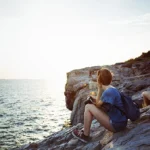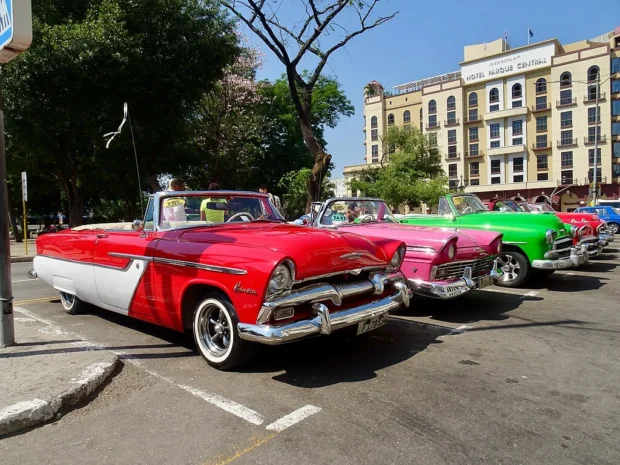Havana is not just a city you visit; it’s a place you feel and hear. The old cars rumble by, their paint chipped but proud. Music floats from open windows like a secret language. Walking through Havana means stepping into a story where every cracked wall and narrow alley whispers tales of Cuba’s past and present. Whether you have a few days or a few weeks, this city offers moments that stay with you, beyond the guidebooks or typical tourist routes.
Table of Contents
Wandering Among Havana’s Iconic Landmarks
Start near the Malecon, the long seawall where waves crash and locals gather to share smoke and laughter at sunset. This stretch is perfect for watching fishermen casting their lines or spotting kids daring the ocean with bold dives. Not far from here, you’ll find the Plaza Vieja, a square surrounded by colorful buildings with peeling paint, cafes, and musicians performing in corners. It’s a lively scene where time feels both fast and slow.

A must-visit is the old Cuban Capitol building. Its vast dome soars like a crown over the city, a reminder of Havana’s political history. Walking inside, you get a sense of grandeur that once defined Cuba’s ambitions. History buffs will appreciate the Museum of the Revolution in the former Presidential Palace, where exhibits reveal revolutionary stories through artifacts and photographs, putting human faces on historic events.
For a taste of old Havana’s elegance, visit the Gran Teatro de La Habana. Its ornate facade and theater interiors tell stories of ballet and opera that survived decades of change. If you’re there during a performance, even better-tickets can be affordable, and the experience unforgettable.

Hidden Havana: Quiet Corners Off the Beaten Path
Beyond the busy plazas, Havana hides quieter neighborhoods where life unfolds at a different rhythm. Just east of the old city, Centro Habana pulses with energy yet offers intimate spots like small cafes where Cuban coffee tastes stronger and sweeter than you imagined. Here, murals splash color across walls, and street artists sketch the city’s spirit.
After exploring Havana’s vivid culture, some travelers enjoy comparing its lively streets with Brussels’ charming mix of old and new for a fresh city experience.
Head to Quinta Avenida in Vedado to discover a local favorite: small galleries and artisan workshops tucked behind unassuming doors. These places show the heart of Cuban creativity, far from souvenir shops. Chatting with artists, I learned about the struggle and pride of making art in a place where resources are limited but ideas are rich.

One quiet morning, I stumbled onto Callejón de Hamel, a narrow alley filled with Afro-Cuban art and rhythms. Elders play drums, their beats echoing deeply. This alley is more than a place-it’s a cultural ritual. Walking here feels like stepping into a living painting, where religion, music, and history blend seamlessly.
Where to Stay for Havana’s True Feel
Forget the big hotel chains. Havana’s charm reveals itself best in casas particulares-private homes that offer rooms to travelers. Staying here means waking up to the smell of fresh coffee and chatting with families who know the city inside out. Neighborhoods like Old Havana and Vedado provide different vibes; the former is historic and bustling, the latter cooler and more residential.

Some casas have terraces where you can watch the sunset over the city’s rooftops. Others are tucked in quiet streets where nighttime sounds are just the distant hum of music and lively conversations. Rooms vary from simple to stylish, but all offer an intimacy hotels often miss. Booking early is wise, as these homes fill up fast, especially in high season.
Tasting Havana: Food That Tells a Story
Cuban food is simple but full of flavor, and Havana serves it best in small, friendly spots. In the Centro Habana district, you can try ropa vieja, shredded beef simmered in tomatoes and spices-a comforting dish with roots in Cuban kitchens. Here, paladares (small family restaurants) offer meals cooked with love and a side of stories.

For a different bite, visit a market like Mercado Agropecuario in Vedado. It’s not just about buying; it’s about watching life happen-people bartering fruits, fish glistening on ice, and vendors calling out prices. Street snacks like croquetas and tamales are perfect quick treats, often enjoyed with a cold cerveza.
Don’t miss trying a café cubano, the espresso strong and sweet, served in tiny cups that pack a punch. Locals drink it several times a day, often standing at street corners gathering news and gossip.

Getting Around Havana
Arriving at José Martí International Airport, you’ll notice a gentle pace right from the start. To reach the city center, public buses are available, though slower and crowded; another option is a shared shuttle van where fellow travelers often share tips and stories. Once in Havana, walking is the best way to absorb its soul. Streets are packed with rhythms and faces you want to take in slowly.
Bicycles and vintage American cars are common sights on the roads. These classic cars might look like movie props but are daily rides for many locals. If you want to blend in, renting a bicycle or using classic bike taxis can be a charming way to navigate the narrower streets where bigger vehicles can’t go.

Understanding Havana’s Culture and Customs
Havana’s culture flows like its music-vibrant yet deeply rooted in tradition. Greetings are warm; a firm handshake or a light cheek kiss is common among friends and acquaintances. When visiting homes or small shops, patience and small talks go a long way. Cubans appreciate when visitors show respect for their language and customs, even with simple attempts at Spanish.
A few simple tips: never photograph people without asking, especially in sensitive places like markets; don’t rush conversations, as Cubans enjoy taking time to connect; and be mindful when discussing politics-many carry complex feelings shaped by history.

Public holidays and festivals serve as windows into Havana’s soul. The festival of San Juan brings music and dancing to the streets, while religious ceremonies blend African roots with Catholic traditions-spectacles of color, music, and community. Participating respectfully can offer insights that no guidebook can capture.
Anecdotes and Quirks from Havana’s Corners
One evening, I met an old man sitting on a stoop in Old Havana, surrounded by stacks of faded postcards. He told me how these postcards carried messages from loved ones abroad during times when phones were scarce. Each card held a story of hope and longing-tiny windows into personal histories entwined with the city’s fate.

Another time, a street vendor showed me a tiny book of hand-drawn cartoons about daily life in Havana. Humor is a vital survival skill here. Even in hard times, laughter tints the city’s gray walls and cracked sidewalks.
Did you know Havana has an abandoned amusement park on the outskirts? The skeleton of its ghostly Ferris wheel stands still, a monument to dreams frozen in time. Locals say it’s a place where kids dare each other to explore, a playground of imagination born in silence.
Final Thoughts on Havana’s Pulse
Havana is a city where time folds and unfolds-where past and present share the same breath. It’s a place for slow walks, loud music, quiet moments, and unexpected encounters. From the historic plazas to the small patios where families gather for meals, Havana keeps its secrets close, inviting those who wish to listen carefully.
So pack lightly, bring an open heart, and leave room for the stories Havana will tell you. This city isn’t just seen; it’s felt, heard, and remembered long after you leave its warm streets behind.

Photographer and writer capturing life through people’s stories and candid street moments.
- Havana (Cuba, February 2023) – 35 by Bruno Rijsman on Wikimedia Commons – cc by-sa 2.0
- Havana (Cuba, February 2023) – 27 by Bruno Rijsman on Wikimedia Commons – cc by-sa 2.0
- SB011 El Malecón Havana 1 by Susanne Bollinger on Wikimedia Commons – cc by-sa 4.0
- El Capitolio Havana Cuba by Nigel Pacquette on Wikimedia Commons – cc by-sa 3.0
- Havana (Cuba, February 2023) – 106 by Bruno Rijsman on Wikimedia Commons – cc by-sa 2.0
- Museo Nacional de Bellas Artes 20160312 by Aniol on Wikimedia Commons – cc by-sa 4.0
- Havana (Cuba) by Rob Oo on Wikimedia Commons – cc by 2.0
- Bodeguita del medio 1 by Luis Alvaz on Wikimedia Commons – cc by-sa 4.0
- Gran Teatro de La Habana (Jan 2014) by Gorupdebesanez on Wikimedia Commons – cc by-sa 3.0
- The neighborhood around the studio of Jose Fuster (11741186355) by Joe Ross from Lansing, Michigan on Wikimedia Commons – cc by-sa 2.0
